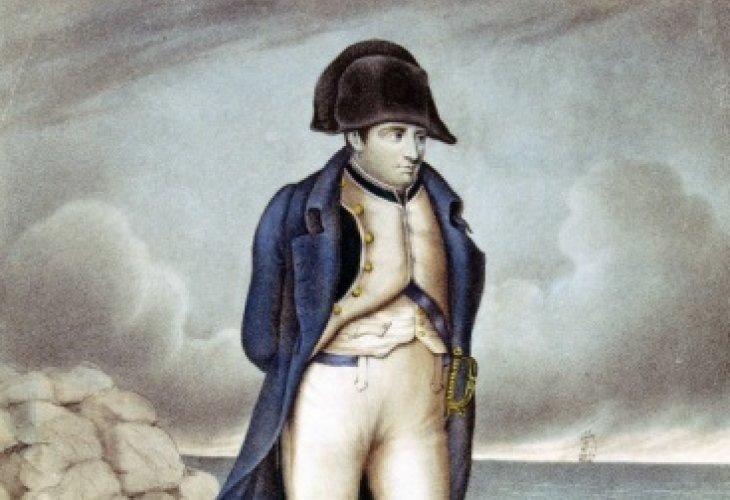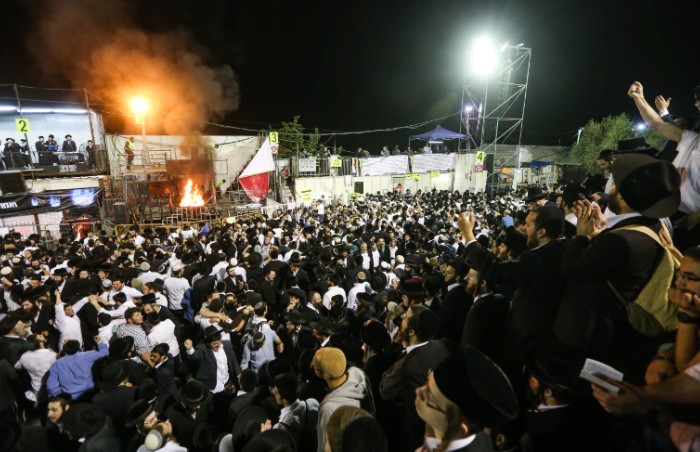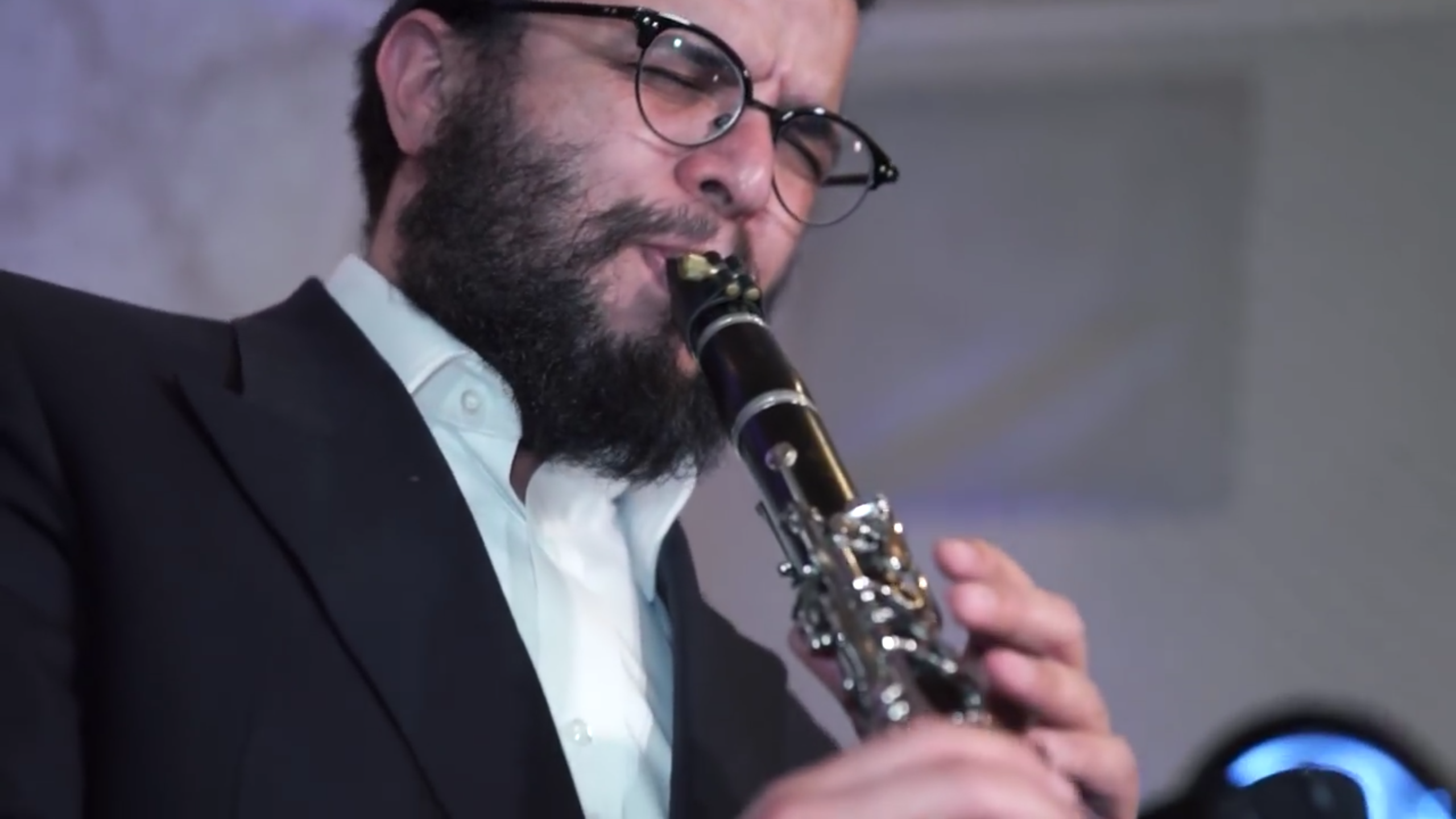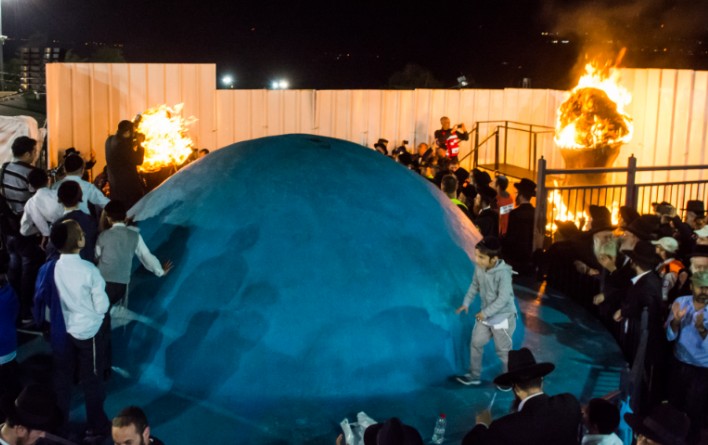The Clarinetist of Meron: "I Play and Cry, Cry and Play, Unable to Contain the Emotion"
For 17 years, clarinetist David Heller has been playing at the Hilula of Rabbi Shimon bar Yochai in Meron, experiencing indescribable emotion. What songs are played there? And how does it feel when the Rebbe ignites the torch and the fire is lit? "In honor of the godly Tanna Rabbi Shimon bar Yochai"
 David Heller
David Heller"Give a little more effect to the microphone, I need the sound to penetrate into the soul of everyone within a kilometer radius," these are the resonating words that pass by the ears of clarinetist David Heller each year, compelling him to play his clarinet with renewed vigor, to bring joy to the multitudes of Israel who come to Meron, and to touch every Jewish heart, aiming to ignite the deepest spark within the soul.
For 17 years, David Heller has made his way every Lag BaOmer to the musicians' stage at Meron. There, he stands, takes his clarinet out of its case, and begins with tunes full of happiness and joy. "At first, in the early years I played," he recalls, "there wasn't someone specific organizing it clearly. So, I would just stand on the stage, sometimes playing almost all day and night until someone else would come to replace me. I wouldn’t feel my hands or my mouth then. I worked like on autopilot. But in the past ten years, there are those who take care to organize everything better. Each musician is invited in advance to play for about two or three hours, after which another musician replaces him."
 (Photo: Flash 90)
(Photo: Flash 90)And the feeling of standing in the heart of the circles, surrounded by tribunes about 20 steps high, is described by Heller as immensely moving. "I always try to be there when the Hilula opens," he narrates, "we always start it with the song 'Bar Yochai Nimshachta Ashrecha' and the joy is simply boundless. Then we proceed in order to the next songs – 'Ve'amartem Koh Lechai, Rabbi Shimon bar Yochai', followed by: 'In honor of the godly Tanna Rabbi Shimon bar Yochai'. Of course, after that come other Meron tunes - all kinds of horas from 150 years ago, known melodies passed down from generation to generation, and tunes of certain Hasidic sects when their Rebbes light the fire."
Every hour on the hour, says Heller, we return to "Bar Yochai Nimshachta Ashrecha", and then all the songs in order again, repeating the cycle.
The Place Closest to the World of Repentance
When Heller looks back on the first time he stood on the stage at Meron, he says everything appeared completely different from today. "Initially, 17 years ago, the stage was very small, about the size of a few tables. There were an organ and drums and maybe a guitar, and I played the clarinet."
Did you, as a member of the orchestra, practice in advance for the performance?
"Of course not! We never practice. These are very familiar songs, and there's no one who doesn't know how to play them. But it is really very strenuous, because you have to play with all your strength. I remember myself in the early years, after long hours of playing, being led to one of the moshav's houses and simply collapsing on a bed and falling asleep. But even while sleeping, I continued to dream of the tunes. Your heart just bursts with emotion."

What is the thing that moves you the most at the event?
"There are many things that move me. I stand and play and see before my eyes so many people I know standing and singing. One year, I met a friend in Meron who had recently gone blind, and yet I saw him singing and dancing with his eyes, that can no longer see, turned towards the bonfire. I remember it was very chilling. In another instance, there was a Jew dancing in front of us, crying profusely and in a whirlwind of emotions. Later, another musician in the orchestra explained that this person had not been blessed with children, but despite that – for years, he’s the happiest person in Meron, one of the main dancers at the Hilula of Lag BaOmer. I see all these scenes and cannot help but cry. I play and cry, cry and play, unable not to."
But the greatest moment is undoubtedly preparing the vat on the bonfire stage – a vat filled with olive oil-soaked rags. "People ascend as if on a conveyor belt to pour olive oil and mention themselves and their families. Then the Rebbe takes the torch and brings it close to the oil-soaked rags, the spark catches, and a minute later, there's fire and flame. It’s indescribable joy, endless circles of joy of unworldly dancing."
But a moment later, when the melody bursts, David no longer sees all these sights around. "At first, I play with my eyes closed because I want to focus only on the melody; after a few minutes, I open my eyes, and then I find it hard to recognize people, mainly seeing black and white, occasionally replaced by undefined colors. There comes a point where I don't even feel like I'm the one playing the tune; it’s like I'm leaving myself and entering another world. The world of melody."
Yom Kippur Inside, Simchat Torah Outside
During the melodies, Heller notes that he manages to experience a special elevation. "Many have noted that the world of melody is very close to the world of repentance," he notes, "and it's known that through melody you can reach the highest levels and return in complete repentance. Indeed, every time during the melody, I have all kinds of thoughts about deeds requiring correction, and I resolve to correct those transgressions and return in complete repentance."
"People are apparently aware of the great importance of playing in front of Rabbi Shimon, and each year anew, my musician friends and I receive *kvitlach* with names, to pray for them. Between melodies, we try to pray for all the names listed."
 (Photo: Flash 90)
(Photo: Flash 90)What are your plans for this year?
"This year, I will of course be on stage," he responds naturally. "It’s my privilege to bring joy to the masses who come to rejoice, and with Hashem's help, I'll continue to do so as long as I am able. The righteous Rabbi Israel of Ruzhin zl identified Meron on Lag BaOmer as Yom Kippur inside (in the cave) and Simchat Torah outside (in the courtyard). I think you can say the same about Meron musicians – Yom Kippur inside (in the heart there are thrills and emotions) and Simchat Torah outside."
He also adds candidly – "When I see this immense joy, I can't help but think of the joy that will be at the time of redemption. May I be among the musicians who will first come to greet the arrival of our righteous Messiah, speedily in our days, amen."

